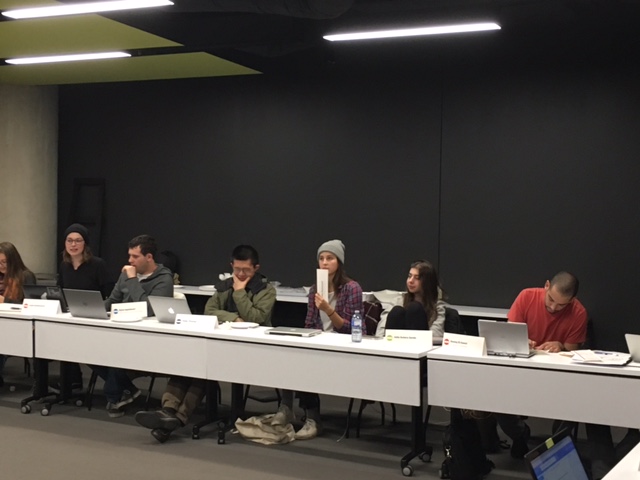Council hears update on the union’s housing project; execs to pay union $840 for SUDS
Concordia Student Union (CSU) general coordinator Omar Riaz and finance coordinator Soulaymane El Alaoui will each pay approximately $840 to the union after accepting plane tickets from the CSU’s insurance provider, Alliance pour la Santé Étudiante au Québec (ASEQ), without disclosing the tickets in their executive report on the Student Union Development Summit (SUDS) conference in Vancouver last August.
“Omar and I will each be writing a cheque to the CSU for that amount before the council in December,” said El Alaoui at the CSU meeting on Nov. 8.
As The Concordian reported in September, council motioned that Riaz and El Alaoui had until Dec. 19 to individually pay the CSU the cost of the flight and a meal in Vancouver, as well as issue an apology.
John Molson School of Business councillor Rory James asked that the apology be submitted two to three weeks before the council meeting on Dec. 22, so that councillors could provide their input. El Alaoui said a first draft of the apology would be submitted by Nov. 22 for council members to discuss before publicly releasing the statement.
Potential conflict of interest
James brought up a potential conflict of interest surrounding Riaz and El Alaoui’s role in the Commerce and Administration Students’ Association (CASA) at the Nov. 8 council meeting. Riaz is a chairperson and El Alaoui is an independent director on the CASA board—neither saw a potential conflict of interest.
“As chair on CASA, I don’t have any voting power. I have no operating role,” Riaz said. “I’ve never expressed my opinion on CASA, I’ve never been part of any decision CASA has taken.”
“CASA and the CSU are not affiliated in any way,” El Alaoui added. “When I’m doing CSU stuff, it has nothing to do with CASA stuff.”
James said he was concerned their positions at CASA could conflict with their ability to make unbiased decisions. “This isn’t to say they’ve broken their conflicts, it’s just to say the potential exists,” he said. The existing CSU regulations that executives follow demand they report conflicts of interest. James’s motion, which passed, requires executives to disclose to the CSU any “decisions or involvement with any corporations on which they sit as a director” in their monthly reports.
Moving forward with CSU housing project
Laurent Levesque, the general coordinator of Unité de travail pour l’implantation de logement étudiant (UTILE), presented council and executives with an update about the CSU housing project. The housing project will be located on Papineau Avenue and will offer 150 spots in about 70 units of cooperative housing, costing between $400 to $440 in monthly rent.
According to Levesque, the total cost of the project stands at approximately $14 million. He also confirmed the mortgage insurance certificate was emitted, meaning almost half of the project funding has been confirmed. “Thirteen [million] out of the $14 million of the project costs are confirmed,” he said. “So we are really close to completing the budget.” Levesque added that the last million is “already in advanced talks” with the last partner to approve the final terms.
“The project has been approved by the borough of Plateau Mont-Royal at the beginning of October,” Levesque said. The current deadline for the project is May 2019, which Levesque pointed out as the “latest time that was allowed in the term sheet.”
James inquired about the project’s risk management plan and budget. Levesque said the scale of the project demands a tight risk-management procedure and the current deadline allows for adjustments if risks or unforeseen factors arise. When councillor James asked: “Why don’t you have a project management professional on staff?” Levesque responded: “The development budget does not allow it […] The truth is everyone [working on the project] is doing risk control.”
Determining the CSU CEO’s pay
Eleven CSU councillors approved a motion to set the union’s CEO pay at a bi-weekly rate of $16.50 per hour and to not exceed $9,000, but not including a bonus for the year.
Thirteen councillors approved the amendment to the previous motion proposed by El Alaoui stating the “finance committee come up with a system to be reviewed by policy committee for implementation and to […] have this same method of payment for the [CSU Deputy Electoral Officer].” Twelve councillors approved the amended motion.
El Alaoui said this would help the finance committee figure out a model policy that the committee could formally implement each year. The total amount that was paid to last year’s CEO was $8,384.28, according to El Alaoui.
Photo by Valeria Cori-Manocchio




